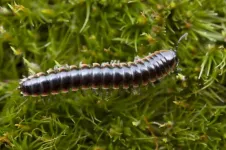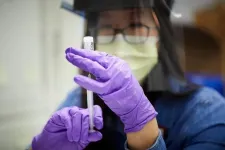A preclinical study published from the laboratory of Dr. Huda Zoghbi, professor at Baylor College of Medicine and director of the Jan and Dan Duncan Neurological Research Institute at Texas Children's Hospital, provides experimental evidence that supports the use of antisense oligonucleotides as a feasible strategy to treat MDS. The study also offers crucial insights into the pharmacodynamics of this approach, which will serve as an important guide for the design and implementation of future clinical trials for this disorder. The study appears in the journal Science Translational Medicine.
The MECP2 gene encodes the MeCP2 protein which is a cellular maestro that orchestrates the expression of thousands of other genes in the brain. Studies show that the dosage and expression of this gene in the neurons must be strictly regulated and maintained at the optimal level. Reduced levels of this protein result in Rett syndrome, a childhood neurological disorder primarily affecting girls, characterized by decreased cognition, inability to perform motor functions, particularly with hands, autism-like behavior, and seizures. On the other hand, excess levels of this protein due to MECP2 duplication cause a syndrome primarily affecting boys, called MDS that is characterized by poor muscle tone and impaired motor abilities, cognitive disability, epilepsy, autistic behaviors, respiratory infections, and premature death.
"The 'Goldilocks' nature of this protein poses an enormous challenge in devising potential therapies for MECP2 disorders. An effective treatment strategy for MDS needs to ensure that the reduction in MeCP2 protein is significant enough to cause a dose-dependent reversal of the associated symptoms but not lower MeCP2 levels to such an extent that it leads to the emergence of Rett symptoms," said Zoghbi, who is also a Howard Hughes Medical Institute investigator.
Antisense oligonucleotides as a potential therapeutic strategy for MDS
Antisense oligonucleotides (ASOs) are small nucleotides that selectively bind and silence the expression of a specific gene's mRNA and have been recognized as an attractive potential strategy to treat MDS. As a therapeutic strategy, ASOs offer several advantages such as limited toxicity and high specificity to the target gene, which in turn means fewer side effects. Moreover, they have been successfully used in the animal models of several neurological disorders to reverse symptoms and have proved safe in humans, including children, in recent clinical trials for certain neurodegenerative diseases.
Previous experiments in the Zoghbi lab showed ASO treatment of mice engineered with an extra copy of human MECP2 successfully lowered MeCP2 levels and reversed the associated symptoms. It is important to note, however, that in those experiments, the rodents also carried a normal copy of the mouse Mecp2 gene, which is not recognized or silenced by the MECP2-ASO that is specifically designed to only target human MECP2 gene.
In MDS patients, since the MECP2-ASO can target and silence both copies of the MECP2 gene, there is a possibility that ASO treatment could significantly reduce the gene dosage to below its physiological levels and thereby put the individual at an increased risk for developing Rett symptoms.
"This scenario is similar to the dilemma physicians encounter with diabetics or high blood pressure patients, wherein the insulin dose or blood pressure medication must be precisely adjusted so the patient's blood glucose levels or blood pressure does not dip too much at any given time," Zoghbi said.
Therefore, before embarking on clinical studies to evaluate the potential of the MECP2-ASO, the researchers conducted this preclinical study to test if SO dosage could be reliably titrated to regulate MeCP2. The goal of the study was to test if it is possible to precisely control MeCP2 levels such that it is lowered enough to reverse MDS symptoms but leave behind sufficient levels of MeCP2 protein in the brain for crucial functions to continue unhindered.
ASOs reverse most MDS symptoms in 'humanized' mouse models
To test this, the team generated a novel 'humanized' mouse model of MDS that closely mimicked the human condition with two copies of human MECP2 and no mouse version of MECP2. These mice recapitulated many of the features of already established MDS mouse models and MDS in human patients.
The mice were then injected with a single large dose of ASOs into the lateral ventricle of the brain, which is similar to the preferred method of drug delivery in clinical settings, which involves injection into the spine through a procedure that mimics a spinal tap. ASOs were widely distributed in various brain regions and were effective in reducing MeCP2 protein levels.
Next, to understand the time-course and sequence of the molecular changes that occur in the brain upon ASO treatment, they conducted a dose-dependent response study. They found that within a week of ASO administration, MECP2 mRNA levels were reduced by 50%, while it took two weeks for MeCP2 protein levels to go down and about five weeks after ASO administration to observe a reversal in the expression of several genes that are regulated by the MeCP2 protein. Interestingly, by ten weeks of ASO treatment, the mice exhibited a significant improvement in several behavioral symptoms such as locomotion and learning deficits that are common among MDS patients.
"The results of this study are really exciting because not only do they prove that some of the MDS symptoms are reversible in adult mice, but they also demonstrate that it is possible to titrate and monitor the dose of ASOs to safely normalize MeCP2 levels without lowering them below the normal range to avoid causing Rett-like symptoms. In addition, we have now identified the temporal sequence of molecular events and identified several molecular markers that undergo change weeks before clinical symptoms, which gives us a tool as well as a window of several weeks, to ensure precise ASO dosing," said Dr. Yehezkel Sztainberg, one of the lead authors of the study and currently a scientist at Regeneron Pharmaceuticals.
"I see a very clear path from these proof-of-concept results to future clinical trials that test the safety and efficacy of MECP2-ASOs in children with MDS. Moreover, our study suggests the antisense strategy could potentially also be used to treat other childhood developmental disorders caused by genetic duplications," Zoghbi concluded.
INFORMATION:
Other authors involved in the study are Yingyao Shao, Qi Wang, Sameer S. Bajikar, Alexander J. Trostle, Ying-Wooi Wan, Paymaan Jafar-Nejad, Frank Rigo, Zhandong Liu, and Jianrong Tang. They are affiliated to one or more of the following institutions: Baylor College of Medicine, Texas Children's Hospital, and/or Ionis Pharmaceuticals. The study was funded by grants from the National Institutes of Health, Howard Hughes Medical Institute, Rett Syndrome Research Trust, Baylor College of Medicine IDDRC, Cancer Prevention and Research Institute of Texas, Houston Endowment, Hamill Foundation, Chao Family Foundation, Huffington Foundation, and Cockrell Family Foundation.


